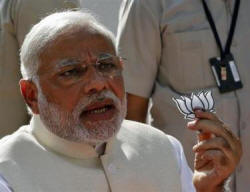|
 India's
Modi Rails Against Illegal Immigrants After Muslim Killings India's
Modi Rails Against Illegal Immigrants After Muslim Killings
 Send a link to a friend
Send a link to a friend
[May 05, 2014]
By Sujoy Dhar and Frank Jack Daniel
KOLKATA/NARAYANGURI, India (Reuters) -
Hindu nationalist Narendra Modi, the prime ministerial front-runner in
India's mammoth general election, on Sunday reiterated his strong stance
against illegal immigrants, just days after a wave of sectarian killings
in the north-eastern state of Assam.
|
|
 India is in the home stretch of a five-week election, which has
heightened ethnic and religious tensions in many parts of the
country and in which Modi's opposition Bharatiya Janata Party (BJP)
looks set to emerge as the biggest group. India is in the home stretch of a five-week election, which has
heightened ethnic and religious tensions in many parts of the
country and in which Modi's opposition Bharatiya Janata Party (BJP)
looks set to emerge as the biggest group.
India deployed troops in Assam on Saturday after more than 30
Muslims were gunned down in three days of what police said were
attacks by Bodo tribal militants, who resent the presence of
settlers they claim are illegal immigrants from Bangladesh.
Modi has repeatedly called for tighter border controls and last week
said illegal immigrants from Bangladesh living in the state of West
Bengal should have their "bags packed" in case he came to power.
At a rally on Sunday he accused the West Bengal state government of
being soft on illegal immigrants because it was looking to secure
votes from ethnic and religious minorities.
"You are concerned about infiltrators and not your own people ...
they must go back, they are robbing the youths of India of their
livelihood," Modi told the rally in the state, which borders Assam.

Police on Sunday said the death toll from the Assam attacks now
stood at 34 after they found the bodies of two 30-year-old women
floating in the Beki river near Narayanguri village, where the worst
of the attacks took place.
A man's body was found elsewhere in the same district. All of the
victims were Muslims.
Fifteen people have been arrested in connection with the attacks,
including 10 forest guards employed by the state government and five
former militants, police said.
Bodo tribesmen have long argued many of the Muslims in their part of
Assam state are illegal immigrants encroaching on ancestral lands.
In 2012, clashes erupted in which dozens of people were killed and
400,000 fled their homes. Assam also has a history of armed groups
fighting for greater autonomy or secession from India.
On Saturday, Prime Minister Manmohan Singh of the ruling Congress
party condemned the latest attacks in Assam. Law Minister Kapil
Sibal accused Modi of making divisive comments.
"This violence has a long history," BJP spokesperson MJ Akbar said
on Sunday. "This knee-jerk reaction of blaming Narendra Modi for
everything is absurd."
Bangladesh's Information Ministry did not immediately respond to a
request for comment on Modi's latest speech.
[to top of second column]
|

LOCAL RIVALRIES
Assam state police said the latest outbreak of violence seems to
have been sparked by the longstanding local rivalries, with Bodo
tribesmen attacking Muslim settlers as punishment for not supporting
their parliamentary candidate in the election.
Residents of Narayanguri village, where the worst of the attacks
took place, said eighteen bodies were wrapped in black plastic
sheeting and buried on Sunday.
Soldiers and paramilitary police continued to guard the village in
the wake of the attack.
"They opened fire with no warning," said Shalam Gaon, the
40-year-old village head, who was cycling home from a nearby market
town on Friday when he heard gunfire and saw flames.
Voting in India's election, the world's largest ever democratic
exercise, concludes on May 12 and results are due on May 16.
Several opinion polls have forecast the BJP will emerge with the
biggest share of the 543 parliamentary seats up for grabs, although
the party could fall short of a majority.
Critics have long accused the BJP of deep-seated prejudice against
India's Muslims, who make up more than 12 percent of the country's
1.2 billion population. The BJP says it only opposes preferential
treatment for any community.
(Additional reporting by Ruma Paul in DHAKA; Writing by Shyamantha
Asokan; Editing by Sophie Hares)
[© 2014 Thomson Reuters. All rights
reserved.] Copyright 2014 Reuters. All rights reserved. This material may not be published,
broadcast, rewritten or redistributed.

 |